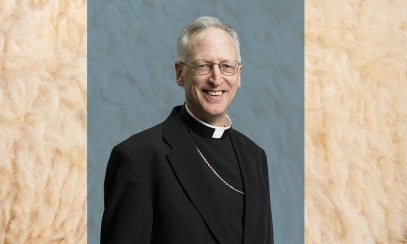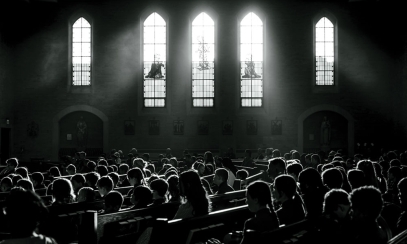
The Participation of the Laity in the Prophetic Mission of Christ
Let us take a look at Christ’s role of prophet and how, as laity, we are called into the prophetic realm. What is meant by this word “prophet”? Oftentimes, the work of the prophet is misunderstood only as the telling of future events. More often than not, it is a proclamation for the present moment, where the kingdom of God is already present. In the Old Testament, prophets were individuals called by God to share a message to his people. The major and minor prophets act with fidelity, though not without some reluctance at times, as they deliver important messages to God’s people. Then, in the New Testament, we see prophets such as John the Baptist and, of course, Jesus himself. As the laity today, how are we called to act as prophets?
In the Gospel of Matthew, we find what is called the Great Commission: “Go, therefore, and make disciples of all nations, baptizing them in the name of the Father, and of the Son, and of the holy Spirit, teaching them to observe all that I have commanded you. And behold, I am with you always, until the end of the age.” (Mt 28:19-20) We see this in dynamic action throughout the Acts of the Apostles, particularly where the new disciples, now filled with the Holy Spirit, went about spreading the kingdom of God.
We get a clearer understanding of our prophetic calling in the magisterial document from the Second Vatican Council, Lumen Gentium. Here, the context for prophetic ministry is evangelization. We have been hearing a lot about the new evangelization in recent years, so it should come as no surprise to us that the Church locates our prophetic calling squarely in this area. “This evangelization, that is, this announcing of Christ by a living testimony as well as by the spoken word, takes on a specific quality and a special force in that it is carried out in the ordinary surroundings of the world.” (LG 35:3)
Many times we assume that the work of prophecy and evangelization belongs to the ordained and professed religious, but in the wisdom of the Church, the laity are best suited for the task of being a witness for Christ “in the ordinary surroundings of the world.” I remember well this point being driven into us in a theology class, where the professor convinced us that we must respond to the call of the Lord in our lives and that the salvation of many souls depends upon that response. If we fail to respond to the call of the Great Commission, there will be many souls who never hear of Christ or have a chance to respond to him.
Lumen Gentium also points out that one of those “ordinary surroundings” is in the home.
“For where Christianity pervades the entire mode of family life, and gradually transforms it, one will find there both the practice and an excellent school of the lay apostolate. In such a home husbands and wives find their proper vocation in being witnesses of the faith and love of Christ to one another and to their children. The Christian family loudly proclaims both the present virtues of the Kingdom of God and the hope of a blessed life to come. Thus by its example and its witness it accuses the world of sin and enlightens those who seek the truth.” (LG 35:4)
One reason we see so many broken situations in the world is because many do not take this call seriously. For too many Catholics, sharing the Gospel is uncomfortable and their faith is relegated to only attending Mass and perhaps praying certain devotions. But there are people who need to hear about the love of Christ right now, and so it is imperative that we answer this call to share in this prophetic role of Christ and heed the exhortation we hear at the end of every Mass to “Go and announce the Gospel of the Lord!”


